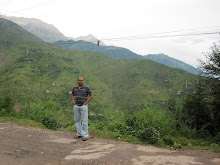It has been some time since my last post. Was kind of stuck for thoughts on a relevant topic. The world economy has been in turmoil for some time now and every day has been a new piece of news creating much chaos in the thought process. It has become very difficult to understand the trends or pattern in the chaos around. I guess economists are better at that and hence I was only trying to gather tit bits from media on the multitude of views on economy. Two high profile "big daddy" visits have happened in recent times, Jeff Immelt and his classmate from Harvard, Jamie Dimon. They seem to be good buddies as their thought process sounds similar. Both say that the actual ground level situation in US economy is not as bad as the statistics or emotions show. It is a different matter that while this is being said by both biggies, some countrymen back home were trying to occupy the wall street etc. Possible that the ground level situation is different, after all these biggies do not run giant institutions for nothing...
Among all this, I had many people speak to me on the way forward and whether it is going to be various alphabetical recession (V,W,U) going forward. Some even asked me if we ever will see the good old days again... Good old days because most of the middle level managers in India have only seen growth phase and what they are going through is an area they do not understand or have a handle on. And more particularly impact on India economy, with what RBI is continuing to do (raise interest rates) and what govt is not able to (rein in scandals). But I am not sure I too understand the situation well. While I continue to feed on the information on how govt are putting various mechanisms to control the recession, many a economists are also advocating lot many interventions.
Me thinks, Darwin was right. Survival of the fittest is the norm of the nature and so is true for the economy too. As with nature, if there were no predators, the balance would go out of whack. So the good times with no predators around would only create huge battle for resources and in the end, someone would turn to being a predator and restore the cycle. Survival of the fittest. Similarly, during the growth decade, when the only way graphs in any organisation were going - up, there festered some major issues which the leaders ignored or were allowed to ignore due to spectacular growth. Rod Canion, the ex CEO of Compaq said once famously in 1990 interview - Growth Hides all ills. So true.... The housing bubble...CDS bubble and leverage in the system.. Impact of hedge funds... Short term targets with huge bonuses linked to them, the only perspective which this era created was - Short Term. The excesses this era created had to be rationalised, had to be flattened, had to be taken care of..
In all this chaos, two kind of organisations were poised well for the survival battle. One, where the leaders were cognizant of the excesses and tried to rein in. Jamie Dimon could be one such leader. Other kind of organisations were those which could not fathom the gravy train and/or were too slow to fathom and did not get into the train. Both of these kind of organisation were well poised to survive the battle. India would be a combination of both the above.
However, the battle to survival was nipped in the budded by the power that be. Fed and other Central banks took matters in their hands and put artificial order to the chaos. And in the process created a chaos of another kind, bulging sovereign debt. With Lehman brothers started the battle of the fittest which immediately was reined in. What the Central Banks worldwide did is only postpone what is inevitable. Excesses in the system have to be taken care of. Natural punishment by the way of organisation perishing has to happen. Today we have situations where the governments are running debts which I am not sure they have clarity on servicing. US being the big daddy here. People dream to have the same lifestyle they led during the excess days.
What we face now is prolonged negligible growth in most of the economies which threaten to pull down emerging markets too. US markets would see prolonged period of very slow growth. Europe has a big battle on its hand to continue with Euro. Beyond a point, Germans and French are going start questioning their leaders on why they should suffer due to uncontrolled behaviour of their neighbours. Euro for them would only be like an albatross around the necks. So we cannot expect growth in these markets too. These two continents would have to go through the pain and belt tightening. Wait till 2012 presidential elections in US are over for some belt tightening measures. Japan could see some growth due to rebuilding. No or very low rate of growth in these markets would have their impact on emerging markets. India, China, Brazil would see growth slowing down. While the domestic markets would support growth to some extent but the impact would be felt. The inflation which many of these countries face today would have impact on the growth story.
Net net, the intervention of central banks have only prolonged but not lightened the suffering; instead of a swift battle for survival. Most of the developed markets would have to contend with truncated lifestyle for times to come. And many of the emerging markets would see slower than expected growth for a few years.
Good Old days would take good many years to come back.
Good Old days would take good many years to come back.
